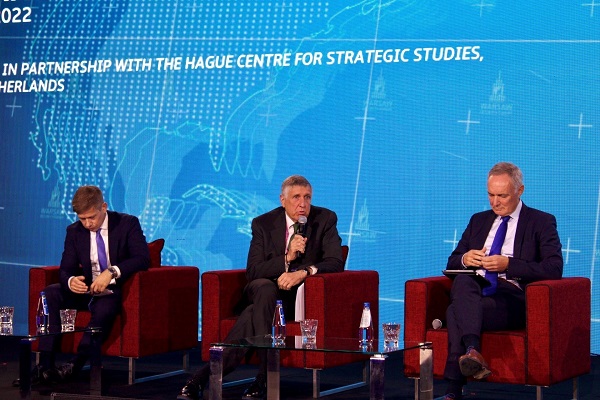 L-R: Christian Zinglersen, Director of EU Agency for Cooperation; François Bausch, Luxembourg's Deputy Prime Minister, Minister of Defence; Tom Middendorp, Chair of International Military Council on Climate and Security, Chief of Defence of Netherlands;
Credit: MAEE
L-R: Christian Zinglersen, Director of EU Agency for Cooperation; François Bausch, Luxembourg's Deputy Prime Minister, Minister of Defence; Tom Middendorp, Chair of International Military Council on Climate and Security, Chief of Defence of Netherlands;
Credit: MAEE
On Tuesday 4 October 2022, Luxembourg's Deputy Prime Minister and Minister of Defence, François Bausch, participated in the ninth edition of the Warsaw Security Forum.
Minister Bausch was invited as a speaker on two panel discussions and he had a bilateral meeting with Hanno Pevkur, Estonia's Minister of Defence.
During the first panel discussion, called "New Lend-Lease-Act – How to enhance NATO's Frontline States?", Minister Bausch emphasised the importance of keeping up European and transatlantic solidarity and military support to Ukraine, in order to allow it to defend itself, as enshrined in the Charter of the United Nations (UN). Minister Bausch also highlighted Luxembourg's contribution to the security of NATO's Frontline States, namely through the provision of high-end space capabilities.
The second panel discussion, "Europe's Green Future: Climate & Security Perspective", focused on geopolitical trends and developments, the opportunities and risks of the energy transition and energy dependency, decarbonsiation of the defence sector, as well as on the prospects for climate security beyond Europe's borders.
Luxembourg's Defence Minister also had a bilateral meeting with his Estonian counterpart, Hanno Pevkur. Discussions covered predominantly the current situation in Ukraine and efforts undertaken by European Union (EU) Member States and NATO allies. The defence ministers highlighted the importance of continuing support to Ukraine. Minister Bausch explained: "So far, Luxembourg has contributed lethal and non-lethal equipment worth €72 million, which corresponds to 16% of our annual defence budget".
The Warsaw Security Forum is an international platform, organised by the Casimir Pulaski Foundation and the German Marshall Fund of the United States, where about 1,500 heads of government, ministers and international experts discuss transatlantic and European security.








